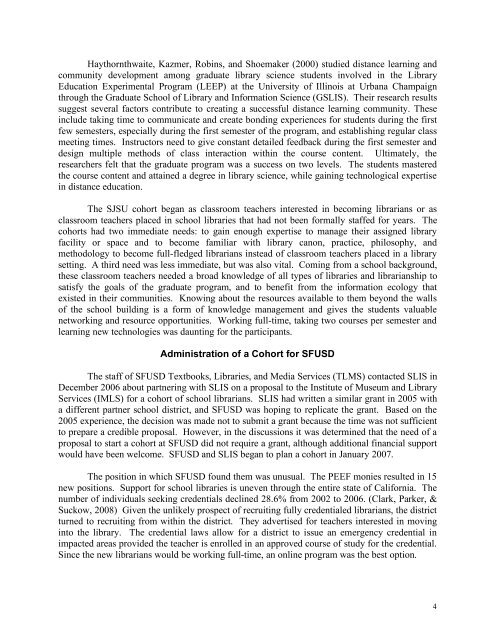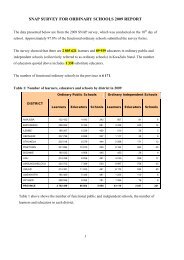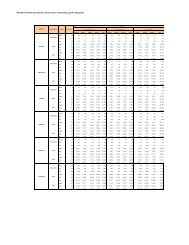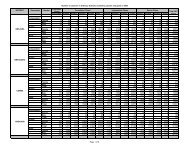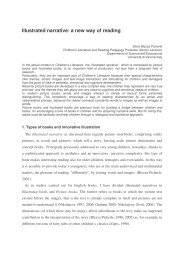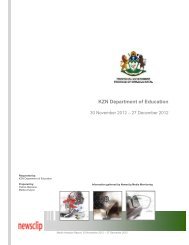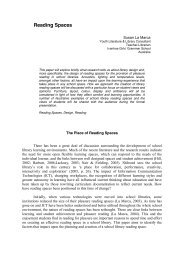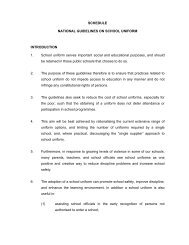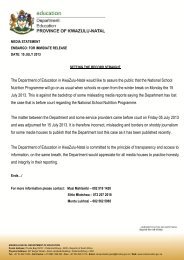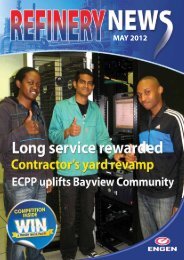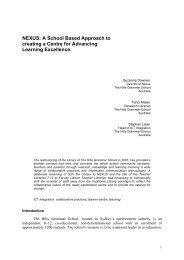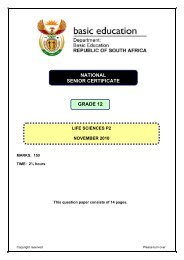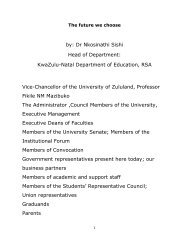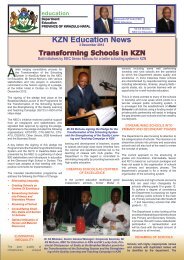Using Technology to Prepare World Class School Librarians to ...
Using Technology to Prepare World Class School Librarians to ...
Using Technology to Prepare World Class School Librarians to ...
You also want an ePaper? Increase the reach of your titles
YUMPU automatically turns print PDFs into web optimized ePapers that Google loves.
Haythornthwaite, Kazmer, Robins, and Shoemaker (2000) studied distance learning and<br />
community development among graduate library science students involved in the Library<br />
Education Experimental Program (LEEP) at the University of Illinois at Urbana Champaign<br />
through the Graduate <strong>School</strong> of Library and Information Science (GSLIS). Their research results<br />
suggest several fac<strong>to</strong>rs contribute <strong>to</strong> creating a successful distance learning community. These<br />
include taking time <strong>to</strong> communicate and create bonding experiences for students during the first<br />
few semesters, especially during the first semester of the program, and establishing regular class<br />
meeting times. Instruc<strong>to</strong>rs need <strong>to</strong> give constant detailed feedback during the first semester and<br />
design multiple methods of class interaction within the course content. Ultimately, the<br />
researchers felt that the graduate program was a success on two levels. The students mastered<br />
the course content and attained a degree in library science, while gaining technological expertise<br />
in distance education.<br />
The SJSU cohort began as classroom teachers interested in becoming librarians or as<br />
classroom teachers placed in school libraries that had not been formally staffed for years. The<br />
cohorts had two immediate needs: <strong>to</strong> gain enough expertise <strong>to</strong> manage their assigned library<br />
facility or space and <strong>to</strong> become familiar with library canon, practice, philosophy, and<br />
methodology <strong>to</strong> become full-fledged librarians instead of classroom teachers placed in a library<br />
setting. A third need was less immediate, but was also vital. Coming from a school background,<br />
these classroom teachers needed a broad knowledge of all types of libraries and librarianship <strong>to</strong><br />
satisfy the goals of the graduate program, and <strong>to</strong> benefit from the information ecology that<br />
existed in their communities. Knowing about the resources available <strong>to</strong> them beyond the walls<br />
of the school building is a form of knowledge management and gives the students valuable<br />
networking and resource opportunities. Working full-time, taking two courses per semester and<br />
learning new technologies was daunting for the participants.<br />
Administration of a Cohort for SFUSD<br />
The staff of SFUSD Textbooks, Libraries, and Media Services (TLMS) contacted SLIS in<br />
December 2006 about partnering with SLIS on a proposal <strong>to</strong> the Institute of Museum and Library<br />
Services (IMLS) for a cohort of school librarians. SLIS had written a similar grant in 2005 with<br />
a different partner school district, and SFUSD was hoping <strong>to</strong> replicate the grant. Based on the<br />
2005 experience, the decision was made not <strong>to</strong> submit a grant because the time was not sufficient<br />
<strong>to</strong> prepare a credible proposal. However, in the discussions it was determined that the need of a<br />
proposal <strong>to</strong> start a cohort at SFUSD did not require a grant, although additional financial support<br />
would have been welcome. SFUSD and SLIS began <strong>to</strong> plan a cohort in January 2007.<br />
The position in which SFUSD found them was unusual. The PEEF monies resulted in 15<br />
new positions. Support for school libraries is uneven through the entire state of California. The<br />
number of individuals seeking credentials declined 28.6% from 2002 <strong>to</strong> 2006. (Clark, Parker, &<br />
Suckow, 2008) Given the unlikely prospect of recruiting fully credentialed librarians, the district<br />
turned <strong>to</strong> recruiting from within the district. They advertised for teachers interested in moving<br />
in<strong>to</strong> the library. The credential laws allow for a district <strong>to</strong> issue an emergency credential in<br />
impacted areas provided the teacher is enrolled in an approved course of study for the credential.<br />
Since the new librarians would be working full-time, an online program was the best option.<br />
4


